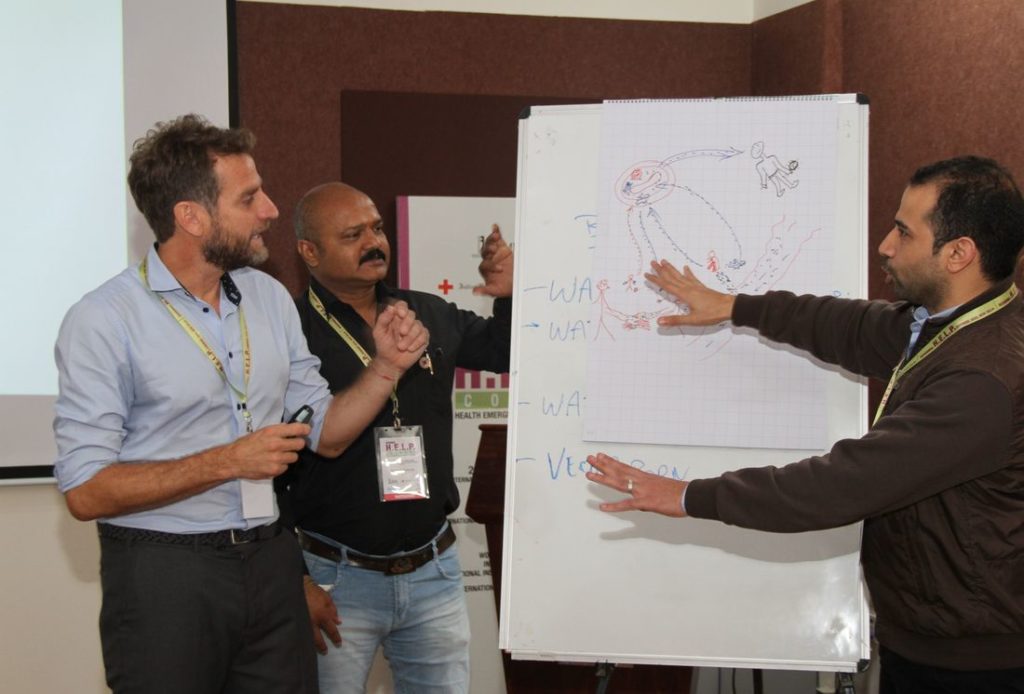Professionals with a background in health, disaster management, water, sanitation, food and economic security, and logistics attended the 4th edition of the Regional HELP (Health Emergencies in Large Populations) Course held in Delhi from 24 February – 6 March 2020. The two-week programme prepared participants, who came from nine countries, for effectively leading an emergency health response.
In India, the ICRC in partnership with International Institute of Health Management Research (IIHMR), National Institute of Disaster Management (NIDM), World Health Organization (WHO) and the Indian Red Cross Society (IRCS) organized the HELP course. It aims to enhance professionalism in health emergency response with an emphasis on decision-making. It uses the public health approach, fostering multidisciplinary responses and bringing out challenges, dilemmas, norms, standards and principles. This synergy between the field expertise of the ICRC and the academic expertise of IIHMR makes the course different from other HELP courses conducted around the world.
Prevention and control of infectious diseases
The course covered essential aspects regarding healthcare, nutrition and economic security, water, habitat and environmental health. It also covered prevention and control of infectious diseases, practical epidemiology in the field, international humanitarian law, security and stress of professionals.
Underscoring the importance of this collaboration at the closing session, Yahia Alibi, Head of Regional Delegation of the ICRC in New Delhi, said, “Together, we have to work towards mitigating suffering and trauma and the HELP Course is significant in this regard as it involves practical learnings based on field experience.” R K Jain, Secretary General, Indian Red Cross Society, congratulated the participants on the successful completion of the course and invited them to share key learnings from the programme. Prof Sankar Das, Director, IIHMR Delhi, talked about the importance of the HELP course in this region. He said, “With disasters impacting our lives more than ever, humanitarian workers must prepare to manage emergencies.”

One group presents a scenario related to water, habitat and sanitation issues during a session at the HELP Course in Delhi. ©ICRC, Ashish Bhatia
Decision-making in crisis situations
Participants shared positive feedback about the value added by the course and underscored its relevance. The programme explored key elements in the principles and practice of humanitarian assistance in emergencies and major crisis. It opened with key concepts related to public health tools, ethical principles and ethical decision-making process to make appropriate and effective decisions in crisis involving large populations. This was illustrated through case studies and brainstorming exercises underscoring the challenges organisations and their representatives in the field face related to bias in sampling of vulnerable groups, dubious data, funding, quality vs quantity, among others.
The course focused on needs assessment, planning and evaluation of activities as much as on humanitarian principles and ethics in the practice of humanitarian action. Scenario-based exercises encouraged the groups to discuss and design the most effective response to a particular humanitarian emergency. It culminated in a simulated media interaction which enabled participants to devise appropriate dissemination techniques.
This course was created in 1986 by the ICRC, in partnership with the World Health Organization (WHO) and the University of Geneva, to professionalise the delivery of humanitarian assistance during emergencies and to promote professional ethics and humanitarian principles. Since then, it has been held in various parts of Europe, Latin America, North America, Africa and Asia. Since inception, approximately 4,000 health professionals and humanitarian aid workers from the International Red Cross and Red Crescent Movement, United Nations agencies, non-governmental organisations, ministries of health, military medical services and academic institutions have attended the course. The HELP course is currently offered in nine locations around the world. For further information please consult the website.

